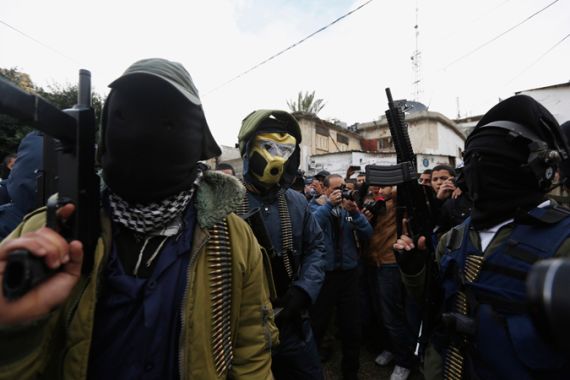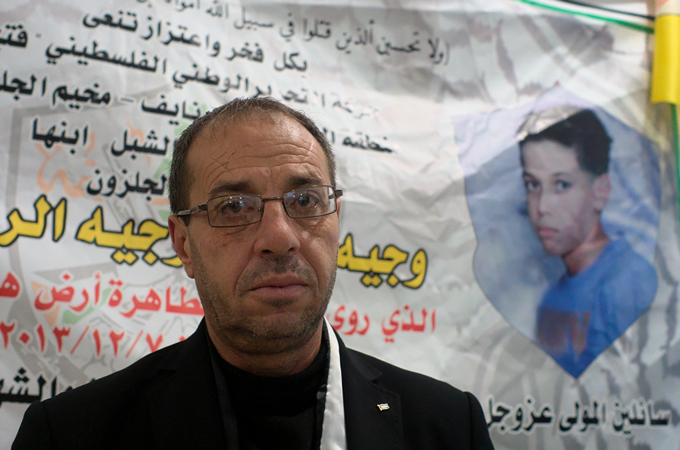Teen gunned down in the Occupied Territories
Questions raised after Palestinian teenager shot dead under mysterious circumstances.

Jalazoun, Occupied West Bank – Two unfinished rooms at the bottom of a modest house in this refugee camp make up the club rooms of the Brigades of Muhammad Samara. The walls are bare cinder blocks, there is no electricity and the rooms’ contents consist of some couches, chairs and a coffee table. But for the children forming the group, the rooms are an important space.
“We used to come here if we’d ran away from our parents and we would all hang out here,” says the group’s leader, Muhammad Samara. Aged 16, he attained the eponymous honour by right of being the eldest of the members. He produces a page of notebook paper with the group’s insignia drawn at the top and its members’ names written underneath in pencil.
His eyes stops at one of the names, Wajih Wajdi al-Ramahy, who was killed by a single gunshot wound on last Saturday afternoon.
“He always sat there,” says Muhammad, Wajih’s cousin, pointing to a spot on one of the couches. “No one will sit there anymore.”
The house belongs to Wajih’s father and the circumstances of the 15-year-old’s death remain unclear with statements from witnesses differing in their accounts of events. What is known is that shots were fired by Israeli soldiers, he was hit in the back and later died from his wounds at Ramallah hospital.
We went to buy some cola and on the way back we heard shots and Wajih just fell on the ground.
Shots fired
Sprawling down a hillside on the outskirts of Ramallah, Jalazoun sits adjacent to Beit El, an Israeli settlement, home to about 6,000 people. At the entrance to the camp, a large United Nations school is a prominent landmark.
Friends of Wajih denied there were any youths throwing rocks at Israeli soldiers at the time of the shooting and say they were playing football together at the school before going to buy something at a nearby supermarket.
“It’s the only place in the camp we can play football. We went to buy some cola and on the way back we heard shots and Wajih just fell on the ground,” his friend Mustapha Nanel, 15, said. “We carried him and called an ambulance but every time we called they didn’t believe us and hung up the phone so we took him to the hospital in a taxi.”
Muhammad Samada was also present and said he saw four soldiers close to the settlement.
“They were running towards us and shooting at us,” he said. “There were about six shots. Wajih was still alive when we put him in the taxi but he became unconscious as we reached the town.”
Wajih’s father, Wajdi, also said there was no rock throwing by Jalazoun youth at the time his son was shot, and claimed the perpetrator was a sniper at a guard tower.
“My son wasn’t throwing rocks and the distance to the settlement was nearly 400 metres, so it was impossible for him to be a threat to the soldiers,” he said. “The soldiers were showing off in front of the settlers.”
An Israeli Defense Force official told Al Jazeera in a brief statement that comment would not be made on specific aspects of the events. “There were routine operations by IDF personnel in the area to prevent rock throwing activities, and all aspects are currently under investigation by military police.”
‘Deeply concerned’
An investigation conducted by the Palestinian Centre for Human Rights (PCHR) found there had been clashes between children from the camp and Israeli soldiers.
 |
| Wajdi al-Ramahy at his son’s funeral [Lazar Simeonov/Al Jazeera] |
A statement published on the organisation’s website said “dozens” of youth set fire to tires near the school and began throwing rocks at Israeli soldiers. According to PCHR, Israeli soldiers exited the settlement and, along with soldiers stationed at an observation tower, opened fire on the children.
“PCHR is deeply concerned over this crime, which further proves the use of excessive force by Israeli forces against Palestinian civilians in disregard for the civilian’s lives,” the statement said.
B’Tselem, an Israeli organisation monitoring human rights in the occupied Palestinian territories, also investigated the events of Saturday and said clashes had taken place between camp residents and Israeli soldiers. Spokeswoman Sarit Michaeli said witnesses saw soldiers exit the settlement and enter an orchard near the school.
“Witnesses say the soldiers only used live ammunition and no non-lethal crowd control measures, like tear gas or rubber-coated bullets,” she said.
“The IDF say the soldiers only fired in the air and, as we understand, the medical reports found there was an entry wound but no exit wound. So we are awaiting the official autopsy findings and that will show whether it was an army bullet and whether there will be questions as to how he was killed if soldiers only fired in the air.”
While unable to confirm whether Wajih had participated in rock throwing, Michaeli said witnesses did attest he was not shot on the road near the school.
“The witnesses we spoke with say he was shot in the orchard where the soldiers were seen, and they saw his body being carried out of the trees,” she said.
Body count
Wajih Wajdi Al-Ramahy became the 26th Palestinian killed by Israel in 2013, and Michaeli said she feels little encouragement that any Israeli investigation into his death will be timely and conclusive.
“Massive past experience shows the investigation will come to nothing but will take at least two years to reach that point,” she said. “Our long-term research shows it is virtually unheard of for an Israeli soldier to be held accountable for harm inflicted on Palestinians.”
The Palestinian Authority should go immediately to the International Criminal Court and hold Israel accountable for its crimes.
Internationally recognised procedures were for such investigations to be timely, effective, impartial and transparent, Michaeli added.
“Israeli security forces do not adhere to any of these standards and this is unacceptable,” she said.
Rain fell heavily on mourners at Wajih Al-Ramahy’s funeral on Sunday. Those who could sought shelter in buildings adjacent to the cemetery while others braved the rain as the body was lowered into the ground to salvos of gunfire from masked men.
Among the crowd was Mustafa Barghouti, leader of the Palestinian National Initiative party and a member of the Palestinian Liberation Organisation’s Central Council. He called on the Palestinian Authority to withdraw from negotiations with Israel.
“In my opinion, Israel is using the negotiations as a cover for its crimes against Palestinians and for expanding its settlements,” he said. “The Palestinian Authority should go immediately to the International Criminal Court and hold Israel accountable for its crimes.”
Seventeen Palestinians and four Israelis have died since the re-commencement of US-led negotiations in July.
Wajih’s friend, Alaa Safy, 16, witnessed his shooting and said he recently began work with a local carpenter.
“He wasn’t interested in going to university and had been working for two months,” Safy said. “Everybody loved him and he was always joking.”